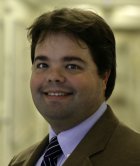 EUGENE, Ore. -- (May 19, 2011) -- Pet lovers may wish to find their way to the final talk of the University of Oregon's public lecture series "The Individual in the Genomic Era." It's all about dogs -- specifically the genetic similarities and differences among the many breeds, domestic and wild.
EUGENE, Ore. -- (May 19, 2011) -- Pet lovers may wish to find their way to the final talk of the University of Oregon's public lecture series "The Individual in the Genomic Era." It's all about dogs -- specifically the genetic similarities and differences among the many breeds, domestic and wild.
Carlos Bustamante, professor of genetics at Stanford University, will speak on "Teaching an old dogs new tricks: Insights into evolution from man’s best friend" at 7 p.m. Monday, May 23, in 150 Columbia Hall, 1215 E. 13th Ave. The public is invited.
Dogs have served as model systems for understanding organic evolution since the days of Charles Darwin. In this talk, Bustamante will discuss his own-going collaboration with Elaine Ostrander of the National Human Genome Research Institute and Robert Wayne, professor of ecology and evolutionary biology at the University of California, Los Angeles. Their much-publicized research has sought to document the genetic basis of phenotypic diversity among domestic and wild dogs.
"I'll discuss how we've used maps of phenotypic and genotypic variation among dog breeds to identify a half dozen loci that underlie the majority of variation among dog breeds," says Bustamante, whose research is the interface of computational biology, mathematical genetics and evolutionary genomics. "I'll also use dogs as a model for understanding signatures of selection in the human genome and how what we've learned from dogs helps us identify novel loci underlying traits under selection across diverse human populations."
The first two lectures, given by UO biologist William Cresko and Princeton professor Lee Silver, filled the auditorium in a series that was designed to address cutting-edge issues related to biotechnological advances. Graduate Evolutionary Biology and Ecology Students, a graduate student organization in the Center for Ecology and Evolutionary Biology, organized the series.
Support for lecture series is provided by the Associated Students of the University of Oregon, College of Arts and Sciences, Center for Ecology and Evolutionary Biology and Oregon Humanities Center's Endowment for Public Outreach in the Arts, Sciences and Humanities.
Media Contact: Jim Barlow, director of science and research communications, 541-346-3481, jebarlow@uoregon.edu
Sources: Bryn Gaertner, lead organizer, graduate student in biology, 541-346-0519, bgaertne@uoregon.edu ; and Paul Cziko, president, Graduate Evolutionary Biology and Ecology Students, (cell) 217-819-7976, pcziko@uoregon.edu